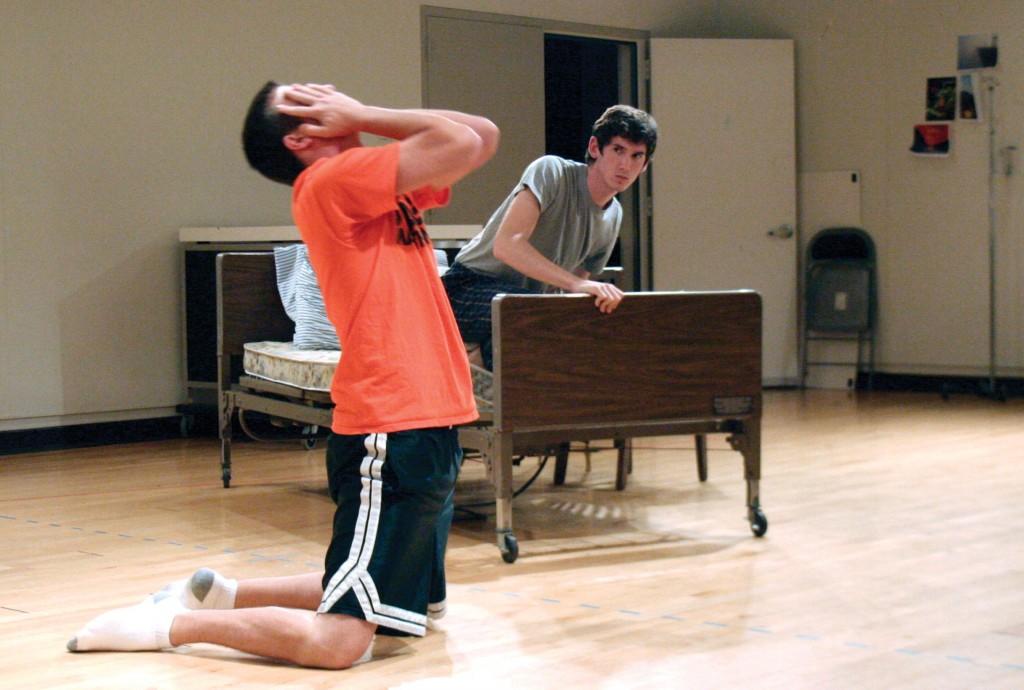Bringing Method to Madness: Mainstage Season Begins With Play by Fordham Alum Don DeLillo
June 25, 2011

Published: September 24, 2009
“Though this be madness—yet there is method in’t.” Polonius’s aside and reference to Hamlet’s insane disquisition in act two of William Shakespeare’s “Hamlet” gives rise to the logical side of lunacy. Though an element of a tragic play, madness often exposes a particular genius, a subject worth pondering and even evaluating and analyzing. It is in this manner that madness is so often used to describe literary figures—a way of characterizing those humans whom we wish to observe with our own “audience eyes.”
Fordham will find its own insanity when the 2009-2010 Fordham College at Lincoln Center (FCLC) Mainstage season begins on Oct. 15. The Fordham theatre department has chosen to bring four plays to the Mainstage under the theme of “madness.” Presented this coming year are “The Day Room” by Don DeLillo, “Mrs. Packard” by Emily Mann, “Sarita” by Maria Irene Fornes and the above-mentioned “Hamlet” by William Shakespeare.
“Each play is a different refraction of madness,” said Matthew Maguire, director of the theatre program and director of the first show, “The Day Room.” “There is no one type of madness… madness being theatrical and not mental.”
“The Day Room,” was written by esteemed novelist, playwright and Fordham College at Rose Hill alum (1958) Don DeLillo.
Credited mostly as a novelist, DeLillo wrote “The Day Room,” his first play, right after the completion of his most prestigious novel, “White Noise” (“White Noise” was published in 1985 and the first production of “The Day Room” was in 1986).
According to Maguire, this is the fourth time the play has been performed and this production marks the first time the play has been performed since its 2007 revision.
“The Day Room” focuses on characters in a psychiatric hospital, where no one is who they appear to be and it is often difficult to tell who is a doctor and who is a patient.
Fariso Maswoswe, FCLC ’10 and the actor portraying the characters of Nurse Baker and Jolene in “The Day Room,” said, “The writing plays tricks on the audience. You can’t believe what [my character] is saying…there are so many truths and you don’t know which one is right.”
“Theatre is a transformative art. The set should transform and the actors transform,” said Maguire. One of the most notable transformations, is the set change from a hospital to a motel between acts one and two.
According to Maguire, Kris Stone, set designer for “The Day Room,” is focused on using a single broken wall that jags as the set, and light is going to be used to transform the wall.
All actors in the play have been cast as two characters, each present in a different act. The patients of the Arno Klein psychiatric wing enter the more audience-interpretive second act as people searching for the Arno Klein theatre.
“The author himself mentioned the greater theme of people being actors and the process of actors dying into characters and then the characters finding new actors,” said Jessica Farr, FCLC ’11 and assistant director of “The Day Room,” as she recalled DeLillo’s visit with the cast and crew on Sept. 10.
Although the play deals with such serious matters as mental illness and insanity, it is often considered a black comedy, somewhere in the realm of Samuel Beckett’s absurdist styling.
“All comedy stems from pain and fear,” Maguire said. “There isn’t any comedy that doesn’t have a cry at its center. Jokes are a whistling past the graveyard.”
Katie Schneller, FCLC ’09 and stage manager for “The Day Room,” said, “It’s a total mind fuck and at the same time, there are quips of brilliance and illumination.”
The characters are portrayed in a state of madness; however, they are highly articluate and rational.
“Everything has a point,” said Mark Maciejewski, FCLC ’11 and actor portraying the characters of Grass and Freddie in “The Day Room.” “To the other patients, my character is insane, but he is completely literate.”
“It is a difficult play to get across to the audience with various layers of reality,” Farr said. “There is a delicate balance between what the playwright is trying to say and how to tell the story of the individuals.”
“There’s no one way to interpret the play… you have to make sense of it yourself. The way I make sense of it will be completely different than the way you make sense of it,” said R.J. Vaillancourt, FCLC ’12 and the actor portraying the characters of Budge and Arno Klein in “The Day Room.”
The theatre department invites everyone to make sense of “The Day Room,” the first Mainstage production of the 2009-2010 school year, when it opens on Oct. 15. It promises to be quite an extraordinary event—a play that is both funny and intellectually thought-provoking.
All Mainstage shows are in Pope Auditorium. Tickets prices are $15 for general admission, $10 for Fordham faculty, alums and staff and $5 for students and senior citizens.
The schedule for “The Day Room” is as follows:
WEEK ONE: Thurs. Oct. 15 at 8 p.m.; Fri. Oct. 16 at 8 p.m.; Sat. Oct. 17 at 8 p.m.
WEEK TWO: Thurs. Oct. 22 at 8 p.m.; Fri. Oct. 23 at 8 p.m.; Sat. Oct. 24 at 8 p.m.











